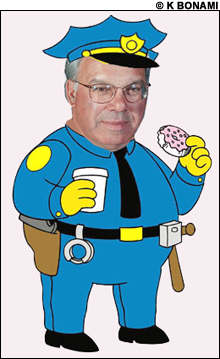
TOMMY KNOWS BEST: He’s not a cop, but Tom Menino seems to believe that he, and only he, knows what’s best for the BPD. |
When it comes to violent crime, Boston Mayor Tom Menino has some advice for his constituents: trust the police and help them do their jobs. “Personal responsibility must be our mantra,” the mayor proclaimed earlier this year, during the Faneuil Hall inaugural that marked the start of his fourth straight four-year term. “If you know someone who has an illegal gun, or you are a witness to a crime, you must speak up and keep the specter of fear far from our neighborhoods.”It’s a reasonable argument. Unfortunately, Menino seems unwilling to extend the same sort of trust to the largely minority residents of Dorchester, Mattapan, and Roxbury, where most of Boston’s increasingly frequent homicides take place, that he’s asking them to give the city. And this, in turn, lends the mayor’s call for trust a decidedly hollow ring.
For starters, consider Menino’s recent announcement that the search for a new police commissioner will be a strictly private affair. Three years ago, Menino charged an eight-person search committee led by Wayne Budd — the former US Attorney and staunch Menino ally — with finding three possible successors to outgoing commissioner Paul Evans; after the committee winnowed down the field, Menino chose Kathleen O’Toole. Now that O’Toole is headed for Ireland (after presiding over a doubled homicide rate and a plummeting homicide-arrest rate), the mayor has assembled a four-person advisory committee — led by David D’Alessandro, the former John Hancock CEO and staunch Menino ally — to help find her successor.

As with the last search, a Menino confidant is in charge, and no substantive framework for soliciting public input seems to be in the offing. Furthermore, tapping four people rather than eight should give Menino greater control over this group’s deliberations. And calling them an “advisory committee” hints that if the mayor doesn’t like the committee’s recommendations, he’ll simply ignore them.
Equally troubling is Menino’s knee-jerk opposition to a civilian-review board (CRB) that would offer independent oversight of the Boston Police Department (BPD). Calls for a civilian-review board seem to intensify every few years, whenever the BPD makes an especially bad mistake: most recently, the issue resurfaced with the fatal shooting of Victoria Snelgrove following a 2004 Red Sox playoff game.
In the wake of Snelgrove’s death, O’Toole, to her credit, suggested that the police could benefit from monitoring by some sort of civilian watchdog. And the final report of the Stern Commission — which O’Toole appointed to investigate the Snelgrove case — made this argument as well, in emphatic terms. “The Boston Police Department has relatively little external oversight for a department of its size,” the Stern Commission noted. “We recommend that, at the very least, a body like ours — without responsibility to separately investigate individual incidents but with the authority to review investigations, collect data, and examine patterns — be established on a continuing basis.”
Menino doesn’t agree, however. When O’Toole first broached creating a CRB in late 2004, the mayor made it clear that he frowned on the idea. “They could take charge of the Police Department,” Menino told the Globe. “We shouldn’t have an aggressive approach where we have a board out there saying, ‘Oh, the police are doing a bad job.’ ”
Earlier this month, meanwhile, City Councilors Felix Arroyo, Chuck Turner, and Charles Yancey were about to propose a relatively muscular CRB, one capable of issuing subpoenas and holding public hearings. But when Menino learned what the councilors were up to, he stole the spotlight by making a proposal of his own — for a watered-down body that would include both police and civilians, and whose proceedings would be closed to the public.
Snitching: a two-way street
What exactly is going on here? Menino, of course, wants us to think that he’s just being practical. After all, if a CRB could keep the cops from doing their jobs, who needs it? Ditto for a commissioner search that includes public participation, which Menino claims could scare away potential candidates. (A recent mayoral press release cast Menino’s opposition to transparency in vaguely heroic terms: “Mayor Menino made it known he would not compromise the city’s ability to attract the very best candidates if the process alone will discourage them from applying.”)

SERVE AND PROTECT: Menino wants control of the BPD, and greater public involvement in the search for O'Toole's replacement would undermine this goal. |
It’s difficult to take Menino’s objections at face value, however. Granted, a civilian-review board might not be the panacea some of its proponents claim it to be. “It’s really been a mixed bag in terms of impact,” says Dr. Michael White, an assistant professor at New York’s John Jay College of Criminal Justice, of the civilian-review movement. “The perception among many people is, ‘if we can just get this board going, it’s going to fix everything,’ and it’s very clear to me that’s not the case.”Even so, casting a CRB as a Trojan horse that would render the Boston Police powerless is absurd. Why, if that were a real risk, would O’Toole have recommended such a body in the first place? And why would so many other cities — Austin, Baltimore, Miami, Philadelphia, and Washington, to name just a few — have them already? If Menino talks the issue over with his fellow mayors, he’ll hear assessments like this one, from a spokesperson for Knoxville mayor Bill Haslam: “The mayor is very pleased with the way the committee” — i.e., Knoxville’s Police Advisory and Review Committee — “has operated. He understands that there were concerns in the police department when it was initially formed, but he really feels like it’s a positive now that it’s underway.”